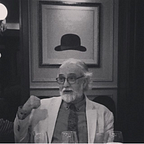The Emerald City
It’s not every day that I connect Buddhism and L. Frank Baum, so I thought I would write this one down. The connection began recently when a friend posted this quote on Facebook:
“What we are today comes from our thoughts of yesterday, and our present thoughts build our life of tomorrow: Our life is the creation of our mind.” — The Buddha [via Gregory Fisher, 2011]
I love the sentiment, but I’m a bit of a quote nerd, always wanting to verify them, always wondering “did he really say that?”, always looking for actual sources. I perk up at Buddha quotes on the internet because, though many Buddhists are very quotable, Buddha himself is another matter. I don’t know whether it was Buddha’s way of expressing himself or the huge gap between the language of the originals and English, direct Buddha quotes usually just aren’t very catchy.
So I was curious about this particular quote and did a little investigation. It had also been a while since I spent much time on the study of Buddhism, so it was a good excuse to engage in a little Buddhist thought. A quick search shows the quote to be a translation of the first part of the very first verse of the Dhammapada, so it is authentic in that sense. But it also is taken from a very poetic translation. The guy who writes the website fakebuddhaquotes.com says of it:
It’s from the Juan Mascaró translation, published by Penguin, which happens to be the first translation I ever encountered. When I read this verse I realized that I was a Buddhist — although I have to say that I now think it’s a terrible translation.
I just love that. The line that made him a Buddhist is one that he now can see beyond. This is actually very Buddhist. The parable of the raft is one of my favorite things about Buddhism. A raft is essential for crossing a river, but once on the other side, do you then have to pick it up and try to carry it through the forest? Or would it just encumber you and prevent you from traveling where you need to go?
The first two verses of the Dhammapada are “twin” verses, a common device in Buddhist texts, so here are the first two verses from a more literal translation:
Mind precedes experience, mind is foremost,
[experience is] mind-made.
If with a corrupt mind one speaks or acts,
from this, disappointment and suffering follow
as the wheel the foot of the ox.
Mind precedes experience, mind is foremost,
[experience is] mind-made.
If with a clear mind one speaks or acts,
from this, happiness and well-being follow
like an inseparable shadow.
Again, from fakebuddhaquotes.com:
To me, the term “life” is far too broad. An extreme interpretation of “life is the creation of our mind” would be that the external world (“life”) is nothing more than an illusory projection of our own consciousness. And, in fact, this solipsistic position is found in certain strands of Hinduism. … Our “experience” being the creation of the mind is much narrower. The Buddha … never argued that the external world was illusory, but merely that our experience of it is simply distorted.
Many people reach similar conclusions from fields such as modern psychology, cognitive neuroscience, or philosophy: though there is an actual world out there, we have no direct experience of that world, all of our experience of that world is filtered through our mind. Our experiences, our preconceptions, our biases, all have an effect on the way we see the world.
For some reason, this idea reminds me of reading “The Wizard of Oz” back when I was ten and being struck by the differences between the book and the classic film that everyone is familiar with. The most memorable difference to me was the fact that The Emerald City is not actually green. Everyone is given green glasses upon entry and required to wear them at all times, so the city merely appears green to everyone. That image has since stuck with me as a metaphor for the human experience. There is a city, but the fact that we call it The Emerald City doesn’t mean that it actually is green, only that we see it as green.
The world we experience is very much colored by the metaphorical lens we view it through. We humans can refine our lenses through study and experience giving us a better and truer view of the world around us, but there is always a lens, there is always distortion. It’s worth listening to people whose experience has shaped their lenses differently from ours, allowing us to learn things that might be hard to see with the lenses we first bring to a problem. We may think we are in an Emerald City, but our experiences and baggage may make us color blind to the tints and shades that surround us.
